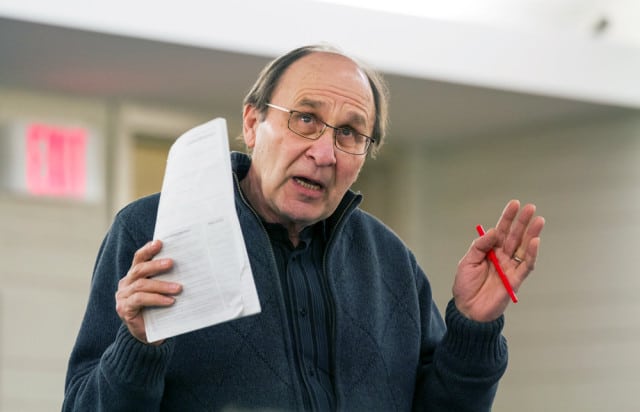
Mathematics professor Ed Tymchatyn critiques the university for still administrating, planning and operating in ways that were efficient 20 years ago at the council meeting.
After almost an hour and a half of debate, University Council voted to include one undergraduate and one graduate student on both program prioritization task forces at the Jan. 24 council meeting.
Program prioritization — or TransformUS, as it’s been dubbed by administrators — is one of the primary methods that the University of Saskatchewan is using to combat the $44.5-million deficit projected for 2016.
The process will be led by two separate task forces responsible for analyzing and ranking academic programs and non-academic, or support, programs. These task forces will give recommendations to the president’s office as to which programs should potentially receive more funding and which should be downsized, merged with other programs, or cut completely.
The recommendations will then be voted on by University Council and the Board of Governors and, if passed, sent to the Provost’s Committee on Integrated Planning to be implemented.
The academic task force will examine academic programming while the non-academic task force will focus on the university’s administrative support services. Each task force will have 20 to 25 members, two of whom will be students.
“There’s a less direct impact on students, but I would still argue that students are those with the most to lose potentially from bad decisions made on the administrative task force”
Dan LeBlanc, Students Against Austerity
The university says task force members must be prepared to devote a minimum of four hours every two weeks to attend committee meetings as well as additional time to prepare for the meetings.
Administration will be accepting nominations for both task forces online until Feb. 13. Students and faculty members who do not rank higher than a department head may be nominated to sit on the academic task force. University employees, who will only be included in the non-academic task force, may also be nominated so long as they don’t hold a senior leadership position.
The task forces are expected to begin meeting in March and work through to November when they will submit their final reports, or recommendations, to the university.
Galen Richardson sits on student council for the College of Law and although he is not in favour of program prioritization, he admits having students on these task forces is a small victory for students across campus.
“It was positive that administration was willing to show flexibility in what was happening considering program prioritization because the week before they were adamantly saying that there wasn’t going to be students on this whatsoever,” Richardson said.
He said that students need to stay informed and that they should always hold administration accountable, not only when issues expand to the scale of TransformUS.
“As students, especially as student representatives, we should keep administration accountable,” Richardson said. “I think that is part of our job, to ask questions about what they are doing and why.”
University Council member and professor of economics Joel Bruneau believes it is key to include students in the task forces. He said students provide different perspectives than those of faculty and administrators.

A panoramic view of the packed Neatby-Timilin theatre during the University Council meeting on Jan. 24.
“In many ways they have an insight [into] what those academic programs do that even faculty might not have,” he said. “If you’re going to evaluate academic programs you’ve got to talk to students, period.”
Bruneau said that students are directly affected by many administrative services, such as food services and residences, and should be involved in the non-academic task force.
Law student and member of Students Against Austerity Dan LeBlanc said that poor decision making by the non-academic task force will have negative effects on students. Cutting support staff from academic programs will lower the quality of education if professors are busy with administrative work instead of allotting time to teaching or to research.
“There’s a less direct impact on students, but I would still argue that students are those with the most to lose potentially from bad decisions made on the administrative task force,” LeBlanc said.
The openness of the motion to implement program prioritization worried LeBlanc at the council meeting. There he urged members to vote against the motion, saying that council should have a more defined plan to carry out the initiative.
LeBlanc foresees council members being forced to vote on implementation plans that they do not agree with at the April 18 University Council meeting.
“I think it sort of opens up the doors in some pretty rough ways,” LeBlanc said.
Update 1/29/13: We have significantly expanded on the original version of this article which was posted on Jan. 24.
—
Photo: Calvin So &
Bryn Becker/The Sheaf